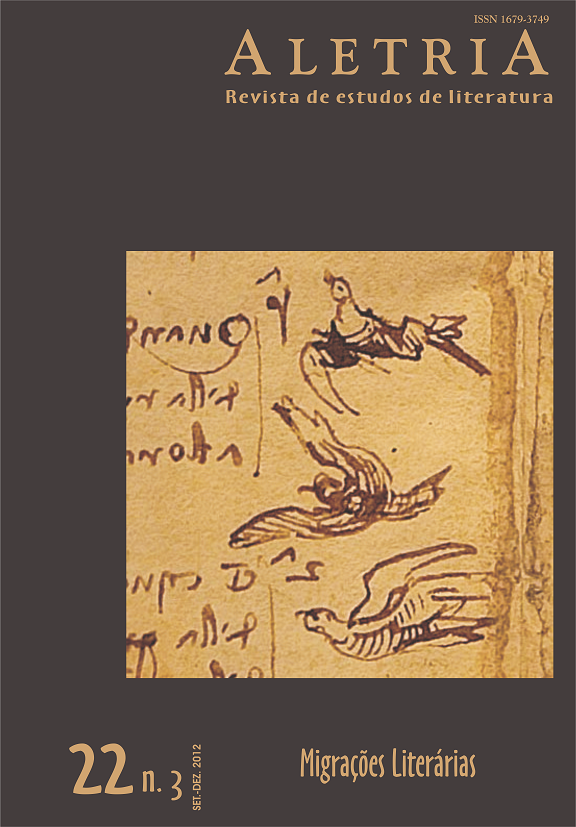Do timbó ao timbó ou o que eu não sei, eu invento
DOI:
https://doi.org/10.17851/2317-2096.22.3.238-252Palabras clave:
narrativa oral indígena, literatura oral, periferia e centroResumen
Este artigo apresenta e analisa a lenda do Timbó, narrada pelo índio Taurepang Clemente Flores. A partir desse texto, discutem-se questões relativas ao trabalho com narrativas orais. O texto de Flores é concebido como literário; logo, a questão central deste artigo está na possibilidade de refletir sobre o literário fora do livro. Com isso, problematiza-se também o movimento entre periferia e centro; local, regional e global; e busca-se pensar a tensão velada, ou mesmo negada, quanto à existência de uma narrativa com valores estéticos oriunda das minorias, como indígenas.
Descargas
Referencias
ALBERTI, Verena. Ouvir contar: textos em história oral. Rio de Janeiro: Editora Fundação Getúlio Vargas, 2004.
ARISTÓTELES. Poética. Trad. Eudoro de Sousa. Lisboa: Guimarães e Cia. Editores, [s. d].
AULETE, Caldas. Dicionário contemporâneo da língua portuguesa. 3. ed. Lisboa: Delta, 1974.
BRANDÃO, Jacyntho Lins. Logos e Léxis na Retórica de Aristóteles. Disponível em: http://www.letras.ufmg.br/jlinsbrandao/JLB_Logos_Lexis_Retor_Arist.pdf. Acesso em: 5 abr. 2012.
BRUNER, Edward. Ethnography as narrative. In: TURNER, V.; BRUNER, E. (Ed.). The anthropology of experience. Urbana: University of Illinois Press, 1986. p. 139-155.
COMPAGNON, Antoine. O demônio da literatura: literatura e senso comum. Trad. Cleonice Barreto Mourão e Consuelo Fortes Santiago. Belo Horizonte: Ed. UFMG, 2003.
EAGLETON, Terry. Teoria da literatura: uma Introdução. Trad. Waltensir Dutra. São Paulo: Martins Fontes, 1997.
FERREIRA, Aurélio Buarque de Holanda. Novo dicionário Aurélio. 2. ed. Rio de Janeiro: Nova Fronteira, 1986.
FIOROTTI, Devair Antônio. Projeto: Narrativa Oral Indígena: Registro e análise na Terra Indígena do Alto São Marcos. PROPESQ, UERR, 2008. (Financiado pelo CNPq)
GALEMBECK, Paulo de Tarso; COSTA, Nonalíssia Silva da. Alternância e participação: a distribuição de turnos na interação simétrica. In: ANAIS DO 3o CELLI, Maringá, Paraná, 2007.
LAUSBERG, Heinrich. Elementos de retórica literária. 5. ed. Trad. R. M. Rosado Fernandes. Lisboa: Fundação Calouste Gulbenkian, 2004.
LEITE, Ligia Chiappini Moraes. O foco narrativo (ou a polêmica em torno da ilusão). São Paulo: Ática, 1985.
NEVES, Maria Helena de Moura. Gramática de usos do português. São Paulo: Editora Unesp, 2000.
PAZ, Octavio. El arco y la lira: el poema. La revelación poética. Poesía e historia. 3. ed. México: Fondo de Cultura Económica, 1990.
POLLAK, Michael. Memória, esquecimento, silêncio. Revista Estudos Históricos, Rio de Janeiro, v. 2, n. 3, p. 3-15, 1989.
RICŒUR, Paul. Tempo e narrativa. Trad. Constança M. Cesar. Campinas: Papirus, 1994. v. I.
RILKE, Rainer Maria. Histórias do bom Deus. Trad. Pedro Süssekind. Rio de Janeiro: 7Letras, 2003.
SARAMAGO, José. O evangelho segundo Jesus Cristo. São Paulo: Cia das Letras, 2005.
SILVA, Victor Manuel de Aguiar e. Teoria da literatura. 8. ed. Coimbra: Almedina, 2009.
ZUMTHOR, Paul. Performance, recepção, leitura. Trad. Jerusa Pires Ferreira e Suely Fenerich. 2. ed. São Paulo: Cosac Naify, 2007.
Descargas
Publicado
Número
Sección
Licencia
Derechos de autor 2012 Devair Antônio Fiorotti (Autor)

Esta obra está bajo una licencia internacional Creative Commons Atribución 4.0.
Authors who publish with this journal agree to the following terms:Authors retain copyright and grant the journal right of first publication with the work simultaneously licensed under a Creative Commons Attribution Non-Commercial No Derivatives License that allows others to share the work with an acknowledgement of the work's authorship and initial publication in this journal.Authors are able to enter into separate, additional contractual arrangements for the non-exclusive distribution of the journal's published version of the work (e.g., post it to an institutional repository or publish it in a book), with an acknowledgement of its initial publication in this journal.Authors are permitted and encouraged to post their work online (e.g., in institutional repositories or on their website) prior to and during the submission process, as it can lead to productive exchanges, as well as earlier and greater citation of published work (See The Effect of Open Access).









